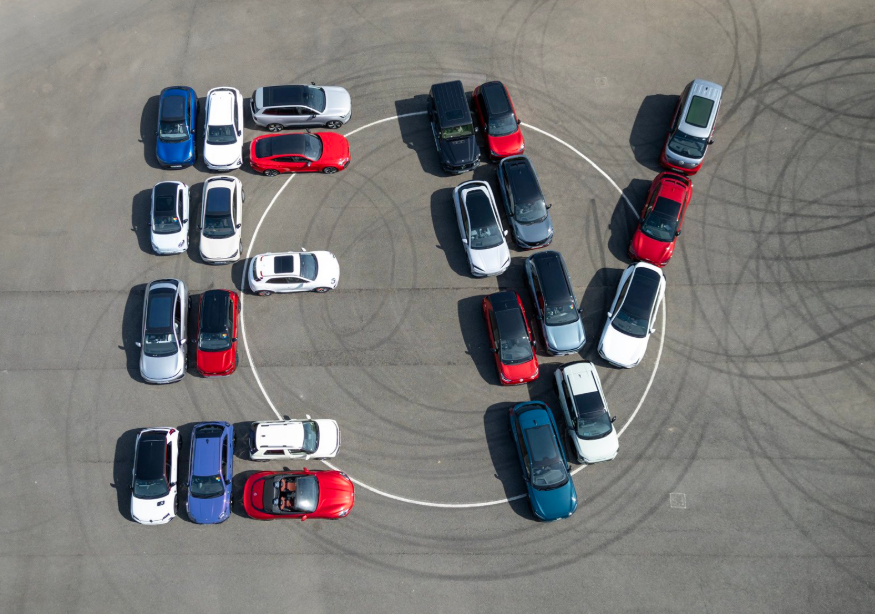UK Electric Car Market:With just five years remaining before the UK government begins phasing out the sale of new petrol and diesel vehicles, the automotive industry is undergoing a significant transformation. At SMMT (Society of Motor Manufacturers and Traders) event at Millbrook Proving Ground offered a clear look at this evolution. Out of the 154 car models on display, 103 were either fully electric or hybrid. This two-thirds majority is a strong indicator of the industry’s commitment to an electric future.
UK Electric Car Market: A Turning Point for the Auto Industry
With just five years to go before the UK begins phasing out the sale of new petrol and diesel cars, the UK electric car market is reaching a critical stage. The 2025 SMMT (Society of Motor Manufacturers and Traders) event at Millbrook Proving Ground showcased 154 new models, 103 of which were electric or hybrid. This two-thirds share signals how deeply committed manufacturers are to an electric future.
SMMT Data says: UK drivers benefit from more electrified model choice than ever, with four in five models available as battery electric, plug-in hybrid, or hybrid, and almost two in five completely zero emission, Average range of BEVs now almost 300 miles on a single charge, up from 235 last year, with PHEVs offering average 50 miles of zero emissions driving and SMMT calls for bold action to convince more drivers to switch, with investment in purchase incentives and infrastructure
Auto Industry Invests Heavily in Electric Car Transition
Mike Halls, head of the SMMT, highlighted that industry investment over the last decade has been focused almost entirely on electrification. With the development of petrol and diesel vehicles winding down, carmakers are steering toward a zero-emission future. But while manufacturers are moving full speed ahead, consumer adoption is still catching up.
UK Electric Vehicle Sales Lag Behind Government Targets
In 2024, only 20% of all cars sold in the UK were electric vehicles. Even with hybrid models included, the total still fell short of the government’s 28% target. This shortfall shows a gap between supply and consumer demand, underlining the need for more widespread acceptance.
Barriers Slowing Down the UK Electric Car Market
A major challenge facing the UK electric car market is public perception. Many drivers still worry that EVs don’t offer enough range, are too expensive, or aren’t safe. While these issues have largely been resolved in newer models, the psychological barrier remains strong. As one journalist at the event put it, it’s a “leap of faith” that many are hesitant to take.
Falling Prices and Growing Range Help Make EVs More Accessible
The good news is that prices are coming down. Some compact electric cars are now available for around £16,000, offering a range of 165 miles. Spending a bit more can get you up to 200 miles. In addition to lower upfront prices, EV owners typically save hundreds of pounds annually on fuel and maintenance, making them increasingly cost-effective over time.
Incentives Needed to Boost UK Electric Car Adoption
Despite progress, the industry believes more government incentives are necessary to reach mass adoption. Proposed solutions include cutting VAT on EVs and reducing public charging costs. However, with limited fiscal space, the government may struggle to offer significant support, putting national EV targets at risk.
Emotional Barriers Remain in the UK Electric Car Market
For many drivers, the appeal of petrol cars lies in the visceral experience—the roar of the engine, the gear shifts, and the driving feel. These emotional connections continue to make it difficult for some consumers to make the full switch to electric vehicles.
Outlook: The UK Electric Car Market Is Moving Forward, Slowly but Surely
The UK electric car market is clearly gaining momentum. With manufacturers leading the way, infrastructure expanding, and public awareness growing, the transition to electric motoring is well underway. However, reaching the government’s ambitious goals will require a combination of lower prices, greater incentives, and continued consumer education. For now, a mixed landscape of electric, hybrid, and petrol vehicles is likely to define the UK’s roads for years to come.
Disclaimer:
The information in this blog post is for general informational purposes only. While efforts have been made to ensure the accuracy of the content at the time of writing, developments in the automotive and energy sectors may result in changes. Readers are advised to verify details independently and consult relevant experts before making any decisions related to vehicle purchases or investments.

